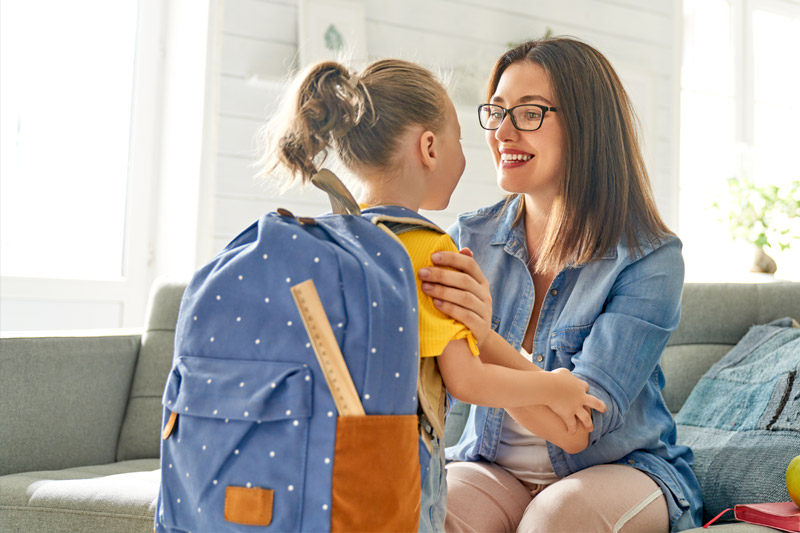Back to School – Getting Ready
Whether the summer was jampacked with camp, play dates, outings, and other fun activities, or filled with complaints about being bored with nothing to do, kids often have a tough time making the back-to-school transition. It can be especially challenging when balancing work and a busy family life.

And while the start of a new school year is exciting for most kids it can also bring with it a spike in anxiety, even for kids who are usually pretty easy going, so it is not uncommon to see a rise in some difficult behaviors from your child including (by age):
- Toddler and Pre-School Age: increased tantrums, separation anxiety, regression (may seem like they are going backwards in their development but it is usually temporary) with toilet training, change in sleep schedule/bedtime problems, increased crying and power struggles, not following directions.
- Elementary Age: talking back, disobedience, fighting and aggression, worries, anxiety, nightmares and sleep schedule changes, bed-wetting, irritable mood, lying, fighting with siblings, difficulty with friends at school, and resistance to school routine.
- Middle/High School: irritable mood, “rude” and disrespectful behavior, power struggles, increased anxiety, shift in focus to peer/friendships, and talking back.
We all want our kids to lead happy and fulfilled lives and at any given time we are doing our best to make that happen. Sometimes tips and guidance from outside sources can help. Actively participating in parenting education, formal or informal can yield strong benefits for both parents and their children. After all, as a parent, who wouldn’t want their child to calmly follow instructions, do well at school, make friends easily and feel good about themselves? A 2016 review of parent education programs from the Wilder Foundation found that children of parents who participate in parenting education often demonstrate higher levels of empathy, sharing, and helping others, and have less destructive behaviors such as aggression, delinquency, and hyperactivity.
According to the Triple P Positive Parenting Program, one of the few parenting programs based on evidence and research, parents who use positive parenting say they feel more confident, less stressed, and have less conflict with their partner over parenting issues.
Triple P’s approach to positive parenting is based on some very simple ideas that have been shown to help make raising children easier. There are hundreds of evaluation papers and randomized controlled trials that show Triple P can work for most families – across different cultures, socio- economic groups and in many different family structures. Some key highlights:
- Triple P reduces problem behavior in children and improve parents’ wellbeing and parenting skills.
- In communities where Triple P is widely available, (which it is in NC) children have fewer behavioral and emotional problems.
- Parents using Triple P say they are less stressed, less depressed, and don’t use harsh discipline.
Here are some Triple P Positive Parenting Strategies that may help with Back to School:
Establishing a Bedtime Routine, including a regular bedtime, a child friendly checklist that the child uses each night to prepare for bed, and preparing the child ahead of time each night before the routine, praising specific behaviors the next morning helps.
To avoid talking back and fighting, Triple P suggests a “Planned ignoring for undesirable behavior.” When your child demonstrates an undesired behavior such as tantrums or talking back, Triple P suggests ignoring the behavior entirely until the tantrum stops. This technique is used is specific situations with the coaching of your Triple P provider.
For teens with anxiety, talk openly about feelings and how to deal with upsetting events, encourage teenagers to develop problem-solving skills (which your Triple P provider can help with one an individual basis).
For stronger communication with your teens, especially about fear-based situations, engaging in “Casual Conversation” and listening to their fears may not sound like a “big deal” to youbut it feels like a bid deal to them.
Manage your own emotions – The most important lesson in Triple P is to manage your own emotions, stay calm, set a positive example, and give positive attention. Triple P is a parenting program but it doesn’t tell you how to be a parent. It’s more like a toolbox of ideas.
If you or someone you know is faced with parenting challenges or would like to learn how to encourage good behavior and manage the challenging behaviors, please call 704-364- 6594. Jewish Family Services’ clinical therapists are credentialed in Triple P. They may use these and other strategies to help get you through the tough times.
